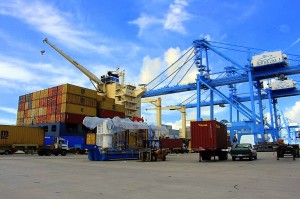Gen. John Kelly (USMC, ret.), the man tapped to lead the Department of Homeland Security (DHS), is about to inherit a security workforce that is more complex than probably any other on the planet. With more than 200,000 employees working around the globe, everything DHS does impacts American security, commerce and way of life. From the sea, air and land patrols of the Coast Guard and Border Patrol; the preparation and response of FEMA and Customs; the vigilance of the Secret Service, TSA and ICE and all of the other pieces of the 24-7 components of the Department, Kelly takes charge of a force like no other.
But the DHS employees are not the only force available to help him do his job. In fact, there are more than 30 million actors outside of the Department who are just as important to his mission success – the private sector.
 More diverse and dynamic than any other constituency on the planet, the American private sector possesses the tools, creativity, means, talents and resources to be the ultimate game changer in the homeland security mission. Besides being the owner and operator of more than 80% of the nation’s critical infrastructure, the creator of new innovations and technologies, and the provider of essential goods and services for the Department (and everyone else), the private sector is the ultimate barometer of the country’s economic security and wellbeing.
More diverse and dynamic than any other constituency on the planet, the American private sector possesses the tools, creativity, means, talents and resources to be the ultimate game changer in the homeland security mission. Besides being the owner and operator of more than 80% of the nation’s critical infrastructure, the creator of new innovations and technologies, and the provider of essential goods and services for the Department (and everyone else), the private sector is the ultimate barometer of the country’s economic security and wellbeing.
The private sector is the biggest, most diverse and most impactful force Gen. Kelly will engage as Homeland Security Secretary. That realization became obvious to the Department’s leadership after Hurricanes Katrina and Rita struck in 2005, when companies like Wal-Mart, Target, Home Depot, Lowes, FedEx, UPS and others were able to perform when others couldn’t. Their life-changing and even life-saving performances shattered some of the institutional attitudes that the private sector was just a self-serving group only interested in making money and providing nothing more.
While turning a profit is an essential part of having a sustainable private sector, there is much more in the prevailing mission of these enterprises. Every one of them is out to create value, make a difference and deliver performance in ways big and small. The products and services they deliver are essential to the livelihoods and economies around the country, and the relationships they forge with their customers, employees, suppliers and partners is often the greatest intelligence barometer they and the Department can ever engage.
For all of the valued commodities that are bought, sold and exchanged every day, information and relationships are by far the most important resource DHS can possess. As a singular force, the private sector is all encompassing by these measures, but by no means is it a uniform group that agrees on everything. For every Coke there is a Pepsi; for every Apple, a Microsoft; for every FedEx, a UPS. The competition that fuels and shapes businesses’ everyday decisions and market share also allows them to offer sharp distinctions and different perspectives to issues and how they can be addressed.
As Gen. Kelly begins to build his relationship with this dynamic and complex community, he can count on those distinctions and perspectives to inform him. As a community, the private sector is not always required, willing or diligent in snapping a salute or replying, “Yes sir!” It’s not a command and control culture, but Gen. Kelly already knows that. In a career as successful as his has been, he no doubt knows the value-added and informed dynamics that come from complex diversity of opinion or action.
Of course, that does not mean the private sector is unwilling to work with him or the Department. Quite the contrary; they absolutely do and will often be the first group to call, text or shout, “How can we help” whenever something bad happens, regardless of the time, place or hour. You could not ask for a more diligent or faithful partner to the Department’s mission, but how they are engaged and how the relationship is forged with them will have a tremendous impact on the success of Gen. Kelly’s time as DHS Secretary.
 Each previous DHS Secretary discovered that fact at various points during their time in office (some sooner than others). When they did, they got fresh feedback and insight that aided their leadership of the Department. My counsel to Gen. Kelly as he becomes secretary is to reach out and make himself available to this complex constituency in as many ways as possible. As great as it is to get a firsthand look and understand the passenger and cargo screening operations of TSA and Customs officers, it is just as important to understand how farmers, manufacturers and shipping agents of all types get things to market quickly, safely and efficiently. This is true for every operation and industry impacted by DHS, but nothing will offer him more challenge and complexity than dealing with cybersecurity, where the overwhelming expertise lies in the private sector.
Each previous DHS Secretary discovered that fact at various points during their time in office (some sooner than others). When they did, they got fresh feedback and insight that aided their leadership of the Department. My counsel to Gen. Kelly as he becomes secretary is to reach out and make himself available to this complex constituency in as many ways as possible. As great as it is to get a firsthand look and understand the passenger and cargo screening operations of TSA and Customs officers, it is just as important to understand how farmers, manufacturers and shipping agents of all types get things to market quickly, safely and efficiently. This is true for every operation and industry impacted by DHS, but nothing will offer him more challenge and complexity than dealing with cybersecurity, where the overwhelming expertise lies in the private sector.
Congress and the outgoing Obama Administration have built a lot of capacity in these areas for DHS and Gen. Kelly to build upon. His willingness and ability to have candid discussions with them (and every other private sector member) should depend less upon manufactured talking points by well-intentioned speechwriters and more about listening to what the real world is experiencing. That feedback (good and bad) will be empowering in numerous ways. Gen. Kelly has in the private sector the ultimate multifaceted force multiplier, primed, ready and able to work with him. All he has to do is ask, and he’ll have the greatest partner imaginable.


